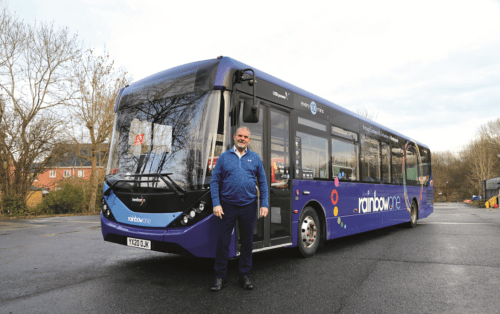
In the first instalment of a two-part interview, Jonathan Welch speaks to newly-retired Trentbarton Managing Director Jeff Counsell about his career in the bus industry.
Trentbarton is a name that many will know as one of the more forward-thinking operators out there, running services across a wide swathe of the East Midlands, centred on Derby and Nottingham and reaching as far as Chesterfield, Uttoxeter, Burton-on-Trent, Mansfield and Leicester. At its head since 2009 has been Jeff Counsell, who started his 24-year stint with the company a decade earlier as its Engineering Director.
Having worked hard to build up a strong local brand and enviable reputation for Trentbarton as a customer-focused, modern operator, it’s easy to imagine that leaving at a time when things are still struggling in the new post-pandemic reality could be difficult, but Jeff, a passionate believer in public transport, has a positive outlook on his career, as I found out when we met for a chat shortly before his last day as Managing Director. Jeff started off by telling me a little about his own background and how he found himself in the bus industry.
“I was born in what was South Lancashire, in a town named Tyldesley. I always had an interest in practical hobbies, I was never excited by academic subjects, except things like mechanical engineering. My father was an engineer down the mines,” Jeff explained. “He looked after conveyor belts, lifts, and other mechanical and hydraulic equipment. He was also practical around the house and maintained his own car. I used to enjoy watching him. He’d let me help, and I got a bug for it.
[…]By subscribing you will benefit from:
- Operator & Supplier Profiles
- Face-to-Face Interviews
- Lastest News
- Test Drives and Reviews
- Legal Updates
- Route Focus
- Industry Insider Opinions
- Passenger Perspective
- Vehicle Launches
- and much more!


